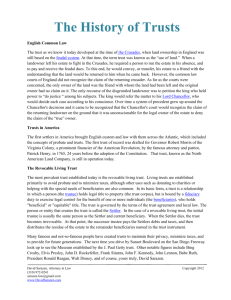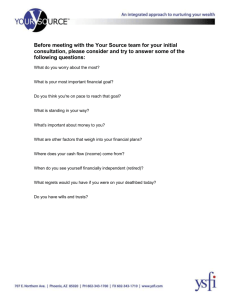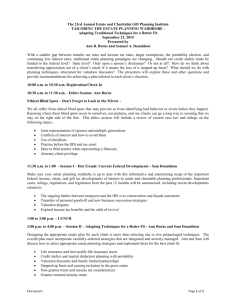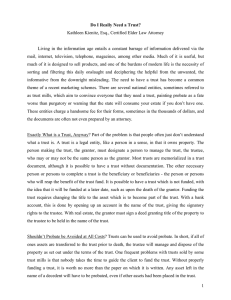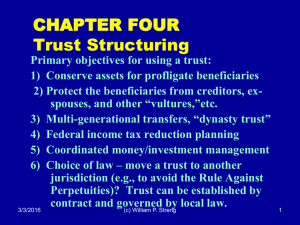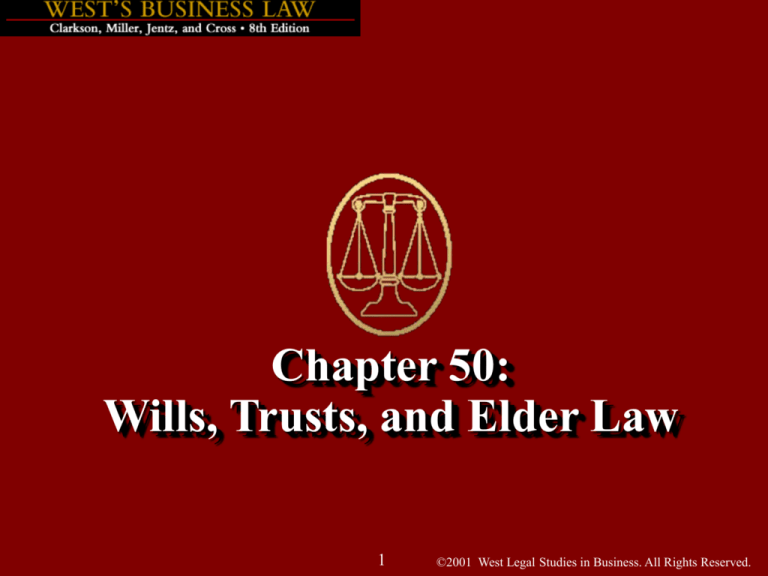
Chapter 50:
Wills, Trusts, and Elder Law
1
©2001 West Legal Studies in Business. All Rights Reserved.
§ 1: Wills
• Will provides for a Testamentary disposition
of property.
– A will is the final declaration of how a person
desires to have his or her property disposed of
after death.
• Testate (One who dies after having made a
valid will).
• Executor v. Administrator.
2
©2001 West Legal Studies in Business. All Rights Reserved.
Laws Governing Wills
• Probate Laws (vary widely among states).
– To probate a will means to establish its validity
and carry the administration of the estate
through a process supervised by a probate
court.
• Uniform Probate Code.
3
©2001 West Legal Studies in Business. All Rights Reserved.
Gifts By Will
• Devise: gift of real estate.
• Bequest or Legacy: gift of personal
property.
• Types of Gifts: specific, general, or
residuary .
• Abatement.
• Lapsed Legacies.
4
©2001 West Legal Studies in Business. All Rights Reserved.
Requirements for a Valid Will
• Testamentary Capacity and Intent.
– Case 50.1: Estate of Klauzer (2000).
•
•
•
•
Writing Requirements.
Signature Requirements.
Witness Requirements.
Publication Requirements.
5
©2001 West Legal Studies in Business. All Rights Reserved.
Revocation of Wills
• Revocation by a Physical Act of the Market.
• Revocation by a Subsequent Writing.
• Revocation By Operation of Law.
6
©2001 West Legal Studies in Business. All Rights Reserved.
Rights Under a Will
• The law impose certain limitations on the
way a person can dispose of property in a
will. Some states force the testator to give a
certain amount of their estate to their
surviving spouse and/or children.
• Beneficiaries can renounce (disclaim) their
shares.
– Spouses in some states can renounce what is
given them in the will and elect to take the
forced share.
7
©2001 West Legal Studies in Business. All Rights Reserved.
Probate Procedures
• Informal Probate Proceedings.
– Family Settlement Agreements.
– Small Estates.
• Formal Probate Proceedings.
– Larger Estates.
– Guardianship appointment to a minor or
incompetent person and trust has been created
to protect that minor or incompetent person.
8
©2001 West Legal Studies in Business. All Rights Reserved.
Property Transfers Outside the
Probate Process
•
•
•
•
•
•
Living Trusts.
Joint Ownership of Property.
Gifts Intervivos (while one is alive).
Life Insurance Policies.
Individual Retirement Accounts (IRA).
Case 50.2: Bielat v. Bielat (2000).
9
©2001 West Legal Studies in Business. All Rights Reserved.
§ 2: Intestacy Laws
• Statues of descent and distribution which
attempt to carry out the likely intent and
wished of the decedent.
– Surviving Spouse and Children, Not in-laws.
– Stepchildren, Adopted children, Illegitimate
children.
– Grandchildren.
10
©2001 West Legal Studies in Business. All Rights Reserved.
Surviving Spouse and Children
• Surviving spouse usually receives only a
share of the estate.
– 1/3 if two or more children.
– 1/2 if one surviving child.
– Entire estate if no children or grandchildren.
• If no surviving spouse or child the order of
inheritance is:
– Lineal descendants.
– Collateral heirs (if no lineal descendants).
• Not spouses of the children, in-laws.
11
©2001 West Legal Studies in Business. All Rights Reserved.
Stepchildren, Adopted Children,
Illegitimate Children
• Stepchildren -- not considered children of
deceased.
• Adopted children -- considered children of
deceased.
• Illegitimate -- must prove paternity.
12
©2001 West Legal Studies in Business. All Rights Reserved.
Grandchildren
• Per stirpes.
– Method of dividing an intestate share by which
a class or group of distributees take the share
that their deceased parent would have been
entitled to inherit had that parent lived.
• Per capita.
– Each person takes an equal share of the estate.
13
©2001 West Legal Studies in Business. All Rights Reserved.
§ 3: Trusts
• Trust -- A right of property (real or
personal) held by one party for the benefit
of another.
14
©2001 West Legal Studies in Business. All Rights Reserved.
Essential Elements of a Trust
• Essential Elements:
– Designated beneficiary.
– Designated trustee.
– Fund sufficiently identified to enable title to
pass to the trustee.
– Actual delivery to the trustee with the intention
of passing title.
15
©2001 West Legal Studies in Business. All Rights Reserved.
Express Trusts
•
•
•
•
•
Living Trusts.
Testamentary Trusts.
Charitable Trusts.
Spendthrift Trusts.
Totten Trusts.
16
©2001 West Legal Studies in Business. All Rights Reserved.
Implied Trusts
• Constructive Trusts.
– Arises by operation of the law in th interest of
equity and fairness.
• Resulting Trusts.
– Arises from the conduct of the parties.
17
©2001 West Legal Studies in Business. All Rights Reserved.
The Trustee
• Trustee’s Duties.
– Act with honesty, good faith, and prudence in
administering the trust and must exercise a high
degree of loyalty toward the trust beneficiaries.
• Trustee’s Powers.
• Allocation Between Principal and Income.
18
©2001 West Legal Studies in Business. All Rights Reserved.
Trust Termination
• Trust ends when expressly specified in trust;
if trust does not provide specification of
termination, trust doesn’t end at death of
beneficiary or trustee.
• When its purpose has been fulfilled.
• When trust’s purposes become illegal or
impossible.
19
©2001 West Legal Studies in Business. All Rights Reserved.
§ 4: Estate Administration
•
•
•
•
Locating the Will.
Duties of the Personal Representative.
Estate and Inheritance Taxes.
Distribution of Assets.
20
©2001 West Legal Studies in Business. All Rights Reserved.
Locating the Will
• If a will -- an executor is usually named.
• If no will or not executor -- court will
appoint an administrator.
21
©2001 West Legal Studies in Business. All Rights Reserved.
Duties of the Personal
Representative
•
•
•
•
•
Inventory and collect assets.
Have assets appraised.
Manage the estate prudently.
Receive and pay valid claims.
Pay federal and state income taxes and
estate or inheritance taxes.
• Post bond -- unless excused.
22
©2001 West Legal Studies in Business. All Rights Reserved.
Estate and Inheritance Taxes
• Federal tax is levied upon the total value
of the estate after debts and expenses for
administration have been deducted and after
exemptions have been allowed.
• State tax is levied in form of inheritance tax
imposed on the recipient of the bequest
rather than on the estate.
– The closer the relative receiving bequest - the
lower the tax.
23
©2001 West Legal Studies in Business. All Rights Reserved.
Distribution of Assets
• Executor or Administrator.
–
–
–
–
submits distribution plan to court.
court approval.
distributes assets pursuant to court order.
accounting is rendered to court.
24
©2001 West Legal Studies in Business. All Rights Reserved.
§ 5: Elder Law
• Legal practice area in which attorneys assist
older persons in dealing with problems
relating to age.
25
©2001 West Legal Studies in Business. All Rights Reserved.
Planning for Disability
• Durable Power of Attorney.
• Health-Care Power of Attorney.
• Living Will.
26
©2001 West Legal Studies in Business. All Rights Reserved.
Medical Planning
• Medicaid v. Medicare.
• Medicaid Planning.
• Criminalizing Medicaid Planning.
27
©2001 West Legal Studies in Business. All Rights Reserved.
Law on the Web
• Famous wills.
• Senior Law Website.
• Uniform Probate Code at Cornell U.
• Legal Research Exercises on the Web
28
©2001 West Legal Studies in Business. All Rights Reserved.

